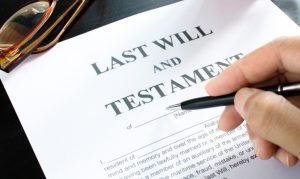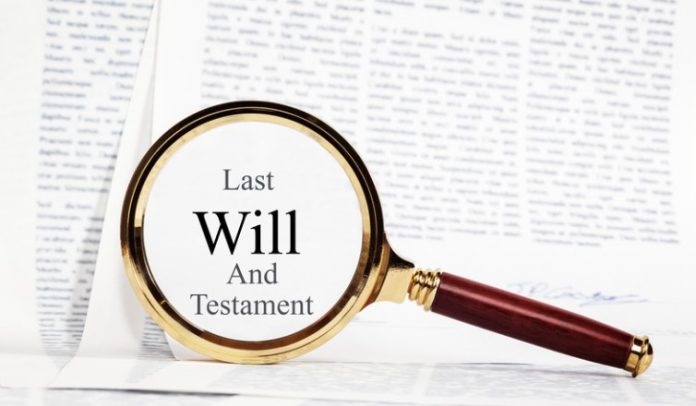Table of Contents
Writing a will is crucial to ensure your assets are distributed according to your wishes after passing away. However, it’s important to remember that there are some things you should never put in your will if you reside in the UK. From funeral arrangements to conditional gifts, we have compiled a list of things you should avoid including in your will.
This blog post will delve into all the legal aspects you must consider when drafting a will and how to ensure its legality in the UK. We’ll also cover what happens if your will is incorrect and if you need a lawyer to write your will. So read on for expert advice on ensuring your last wishes are carried out correctly.
What is a Will?

Maintaining an up-to-date will is crucial for ensuring your assets are distributed according to your wishes after you pass away. Whether you have significant real estate or just a few possessions, a will is a legal document to help ensure your loved ones are cared for.
However, it’s important to understand the legal restrictions on what can be included in a will – such as illegal or against public policy instructions – and seek professional advice to ensure your will is valid and enforceable under UK law. Remember, updating your will regularly is also essential to reflect changes in circumstances or relationships.
Why is It Important to Write a Will?
Creating a will is not just about ensuring that your assets are distributed according to your wishes after death. It’s also about providing for the people you care about, such as minor children or dependents, and avoiding family disputes and legal battles over inheritance.
Without a will, the law determines how your assets are distributed, which may not align with your desires. Regularly reviewing and updating your will can ensure that it remains accurate and relevant to your current circumstances. So don’t procrastinate – take steps to secure your legacy today.
What You Should Never Put in Your Will Uk?
When writing a will, knowing what you should never include is essential. For instance, instructions relating to funeral arrangements shouldn’t be in the will as they may not be read until after the service. It’s also important to note that any property or assets held jointly with someone else cannot be left in the will.
The law automatically passes them on to the surviving party. Furthermore, illegal or against public policy conditions can’t be included in a will. It’s advisable to seek legal advice when drafting a will to ensure it’s valid and enforceable under UK law.
Funeral Arrangements

Funeral arrangements hold great importance and can be a sensitive subject. However, including them in your will is not recommended. Doing so may cause complications during the probate process, as the will may not be discovered until after the funeral.
To avoid this, it’s best to communicate your wishes for your funeral arrangements to your loved ones or create a separate document explicitly addressing this matter. Updating your funeral arrangements as needed and ensuring those closest to you are aware of any changes is also crucial.
Gifts That Are Conditional
When writing a will, it’s essential to avoid making conditional gifts. Gifts that require the recipient to meet specific conditions or criteria can cause legal issues and disputes among your loved ones. Instead of making conditional gifts, consider setting up a trust or other legal arrangement to ensure your wishes are carried out properly.
Additionally, it’s vital to avoid including instructions in your will that could be seen as discriminatory or offensive, as this could also lead to legal challenges and discord among your beneficiaries.
Gifts to Your Pets
When it comes to your furry friends, ensuring they are cared for after you’re gone is important. However, leaving a direct gift to your pet in your will is not recommended as it can cause legal issues and put their well-being at risk. Instead, consider leaving instructions for their care and providing funds to a trusted caretaker.
This way, you can ensure that your beloved pet is looked after without legal complications. Regularly update these instructions, as your pet’s needs may change.
Debts Owed to You
You must ensure you don’t include any debts owed when writing a will. Any outstanding debts at your death must be repaid before your assets are distributed among your beneficiaries. Including debts you’re owed in your will can lead to confusion and delay in the distribution of your assets, so it’s best to handle them separately.
Leaving clear instructions for their repayment can help ensure this process is as straightforward as possible for those left behind.
Assets Owned Jointly With Someone Else

When writing a will, it’s important to consider assets that you own jointly with someone else. These assets cannot be disposed of through your will as they pass automatically to the surviving owner upon your death, regardless of what your will stipulates.
Examples of jointly owned assets include joint bank accounts, jointly owned properties, and vehicles owned by more than one person. It’s essential to remember this when planning the distribution of your assets and to consult with an expert if you need clarification on how your jointly owned property should be handled.
Property Held in a Trust
If a property is held in a trust, it’s essential to understand that it should not be included in your will. This is because the assets within a trust are already designated to specific beneficiaries and will be distributed according to the terms of the trust agreement.
Attempting to include such property in your will can lead to confusion and legal complications. Regularly reviewing and updating your estate plan is crucial, particularly if you have assets in a trust. Seeking advice from an experienced estate planning attorney can help ensure your wishes are properly documented and legally binding.
Property Owned Outside the UK
If you own property outside the UK, it is important to consider the legal implications when planning your estate. Including this property in your UK will cause confusion and legal issues for your heirs, as it may be subject to different laws and regulations.
To avoid complications, it’s best to create a separate will specifically for any tenant property owned outside the UK or consult legal experts on how to deal with it. By taking these steps, you can ensure that your assets are distributed according to your wishes and avoid any unnecessary legal challenges for your loved ones.
Assets You’ve Already Gifted
It’s important to know that assets you have already gifted cannot be included in your will. This means that if you have given a gift to someone, it is no longer considered part of your estate and cannot be distributed through your will.
It’s also essential to remember that any jointly held property or assets with a named beneficiary should not be included in your will. To avoid confusion and legal challenges, it’s best to consult with a legal expert when drafting your will to ensure it is valid and legally binding.
Legal Issues to Consider When Writing a Will

When writing a will, there are several legal issues to consider. First and foremost, your will must be legally valid and meet all requirements. This includes ensuring that it is signed, dated and witnessed correctly. It’s also important to avoid including illegal or unethical requests in your will, as they may be deemed invalid or unenforceable.
Additionally, it would help to be cautious when leaving assets to non-family members or individuals with complicated personal situations to ensure your wishes are carried out properly. Seeking professional legal advice can help you ensure your will is legally binding and accurately reflects your wishes.
How to Ensure Your Will is Legal in the UK?
When writing a will in the UK, it’s essential to ensure it is legally valid. This encompasses several requirements, such as having the mental capacity to make a will, putting it in writing, signing it personally or with someone else, and having two witnesses who are not beneficiaries under your will.
Legal validity can help prevent disputes and ensure your wishes are carried out as intended. Seeking legal advice is recommended to ensure that your will meets all legal requirements in the UK.
What Happens if Your Will is Incorrect?
Ensuring your will is correct guarantees your wishes are fulfilled after you pass away. If your will is incorrect or invalid for any reason, there may be serious consequences for the distribution of your estate. For example, your assets could be subject to intestacy laws instead of distributed according to your wishes.
Additionally, certain assets, such as joint tenancy property, might not be affected by your will. Therefore, it’s essential to avoid any illegal or unethical requests in your will and review them regularly to ensure it reflects your current situation and desires. Seek professional legal advice to ensure your will meets all legal requirements and is legally binding.
Do You Need a Lawyer to Write Your Will?

You may wonder if you need a lawyer to help you when writing a will. While it is not legally required, seeking legal advice can help ensure your will is valid and meets all requirements. Common mistakes in DIY wills can lead to disputes or even render the will invalid, which could cause complications for your beneficiaries.
Additionally, a lawyer can guide complex issues such as inheritance tax and potential challenges from beneficiaries. If you have a complex estate or multiple beneficiaries, seek legal advice to ensure fairness and clarity in your will.
Conclusion
In conclusion, writing a will is essential for everyone to care for their loved ones after they’re gone. However, there are some things that you should avoid putting in your will. Funeral arrangements, conditional gifts, gifts to your pets, debts owed to you, assets owned jointly with someone else, property held in a trust or outside the UK, and assets you’ve already gifted should not be included in your will.
It’s important to consult a legal professional when writing your will to ensure it is legally binding and valid in the UK. In case of any errors, it could lead to disputes among beneficiaries or even invalidation of the whole document.
FAQ – What You Should Never Put in Your Will UK?

What makes a will void UK?
A will could be considered void in the UK if it was not made by a person of sound mind or under duress or coercion. It may also be considered void if it does not meet the legal requirements for execution, such as proper witnessing and signing.
If a newer version of the will supersedes it or the testator revokes it, then the previous will is also void. To ensure your will is valid and legally binding, seek legal advice when creating it.
Does a spouse automatically inherit everything UK with a will?
No, a spouse does not automatically inherit everything in the UK with a will. If there is no will, intestacy laws determine how assets are distributed. Additionally, a will can be contested by family members or other interested parties.
It is important to seek professional legal advice when drafting your will to ensure your wishes are accurately reflected and your loved ones are provided for.
What is the success rate of contesting a will UK?
The success rate of contesting a will in the UK can vary depending on the individual circumstances of the case. Contesting a will can be complex and expensive, so it is important to have strong grounds. Some common reasons for contesting a will include lack of mental capacity, undue influence, and fraud.
If you are considering contesting a will in the UK, it is recommended that you seek legal advice to assess your options and chances of success.
Who keeps the original copy of a will?
The original copy of a will should be kept in a safe and secure place. It is recommended to store it with a solicitor or bank for added security. However, a copy of the will can be provided to family members or beneficiaries for their reference.
It is important to inform your executor or family members where the original copy of your will is stored so it can be easily located when needed.
What happens when a house is left in a will UK?
When a house is left in a will in the UK, the beneficiary of the property must go through probate. This means that the executor of the will is responsible for handling the legal process of administering the deceased person’s estate and ensuring that all beneficiaries receive their inheritance.
It is important to seek legal advice when leaving the property or any major asset in a will to avoid potential legal disputes during the probate process.
Who is entitled to see a will after death UK?
In the UK, the executor of a will is typically the first person entitled to see it after the individual’s death. Beneficiaries named in the will also have a right to access it. In some cases, family members or dependents may be able to see the will as well.
To protect your privacy and ensure that your wishes are carried out properly, storing your will safely and securely is important to prevent unauthorized access by individuals who are not entitled to see it.


